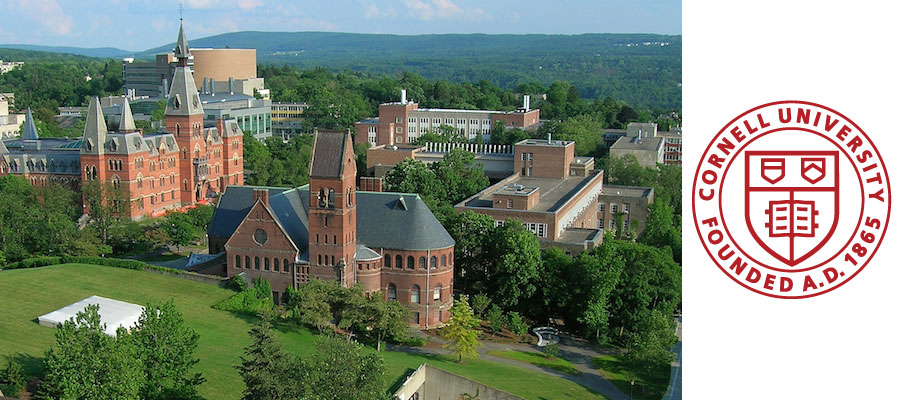The Society for the Humanities at Cornell University invites applications for residential fellowships from scholars whose research projects reflect on the 2021-22 theme of AFTERLIVES. Up to six Fellows will be appointed. The fellowships are held for one academic year.
Fellows include scholars and practitioners from other universities and members of the Cornell faculty released from regular duties. Fellows at the Society for the Humanities are “residential,” and will collaborate with one another and the Taylor Family Director of the Society for the Humanities, Paul Fleming, Professor of Comparative Literature and German Studies. Fellows spend their time in research and writing during the residential fellowship, and are required to participate in a weekly Fellows Seminar workshopping each other’s projects and participating in lively discussions on readings based on the yearly theme.
The nature of this fellowship year is social and communal—Fellows forge connections outside the classroom and the lecture hall by sharing meals following the weekly seminar and attending post-lecture receptions and other casual events throughout the year. Fellows live and work in Ithaca, NY, and are expected to be in their offices on campus frequently. All applicants for Society Fellowships should share in this commitment to creating a supportive and intellectually stimulating community.
Fellows teach one small seminar during their fellowship year appropriate for graduate students and advanced undergraduates. Though courses are designed to fit the focal theme, there are no additional restrictions on what or how the course should be taught. Fellows are encouraged to experiment with both the content and the method of their seminar particularly as it relates to their current research.
2021-22 Focal Theme: AFTERLIVES
The Society for the Humanities at Cornell University seeks interdisciplinary research projects for residencies that reflect on the theme of afterlives.
In times of revolt, times of shutdown, times of crisis, times of hope and transformation, the focal theme of afterlives raises the double question concerning all moments of transition, upheaval, or demise: What lives on and what comes after? What survives, what fades away, and what emerges changed? We invite applicants to interrogate afterlives in this tension between rupture and continuity, difference and persistence, revolution and tradition.
In their diachronic trajectories, the humanities are inseparable from multifarious afterlives. This is evident in the ghosts and specters that haunt history and texts; in spiritual afterlives and rebirths; in artistic, psychic, and intellectual residues and traces; in the notion of ‘aftermath’ whether nuclear, natural, or traumatic; in reception studies and the re-use or re-coding of tales, texts, motifs, images, and ideas; in posthumanist futures, science fictions, speculative ecologies, and multispecies ethnographies.
Afterlives can be utopian projects – from heavenly lives to post-capitalist, post-work, and post-family societies – as well as strangely mundane worlds, in which the flip side of catastrophe is often the quotidian task of living on and with its aftermath. In fact, afterlives all too often have their violent modalities such as the enslavement of Black and Brown bodies persisting in the form of Jim Crow, segregation, mass incarceration, and daily microaggressions.
At stake in afterlives is, then, not only what lives on, but how such ‘living on’ occurs – its modalities, mechanisms, processes, and translations – in which something both recognizable and new, ongoing and ‘eventful,’ persistent and epochal is at work. Thus, we are interested in not only the afterlives of artistic movements, historical periods, literary styles, economic orders, political regimes, and religious institutions, but also how such afterlives are possible in the first place. What structures and enables (pragmatically, imaginatively) the afterlife of events, ideas, and institutions? What needs to take place for something truly new to emerge?
The theme of afterlives asks us to consult both histories and imaginaries, theory and practice, to interrogate how cycles are reproduced or radically ruptured.
The Society for the Humanities invites applications from scholars and artists who are interested in participating in a productive, critical dialogue concerning the topic of afterlives from a variety of disciplinary perspectives.
Qualifications
Fellows should be working on topics related to the 2021-22 theme of Afterlives. Their approach to the humanities should be broad enough to appeal to students and scholars in several humanistic disciplines. Applicants must have received the Ph.D. degree before January 1, 2020. The Society for the Humanities will not consider applications from scholars who received the Ph.D. after this date. Applicants must also have one or more years of teaching experience, which may include teaching as a graduate student. International scholars are welcome to apply, contingent upon visa eligibility.
